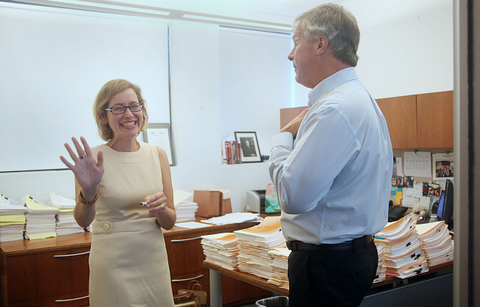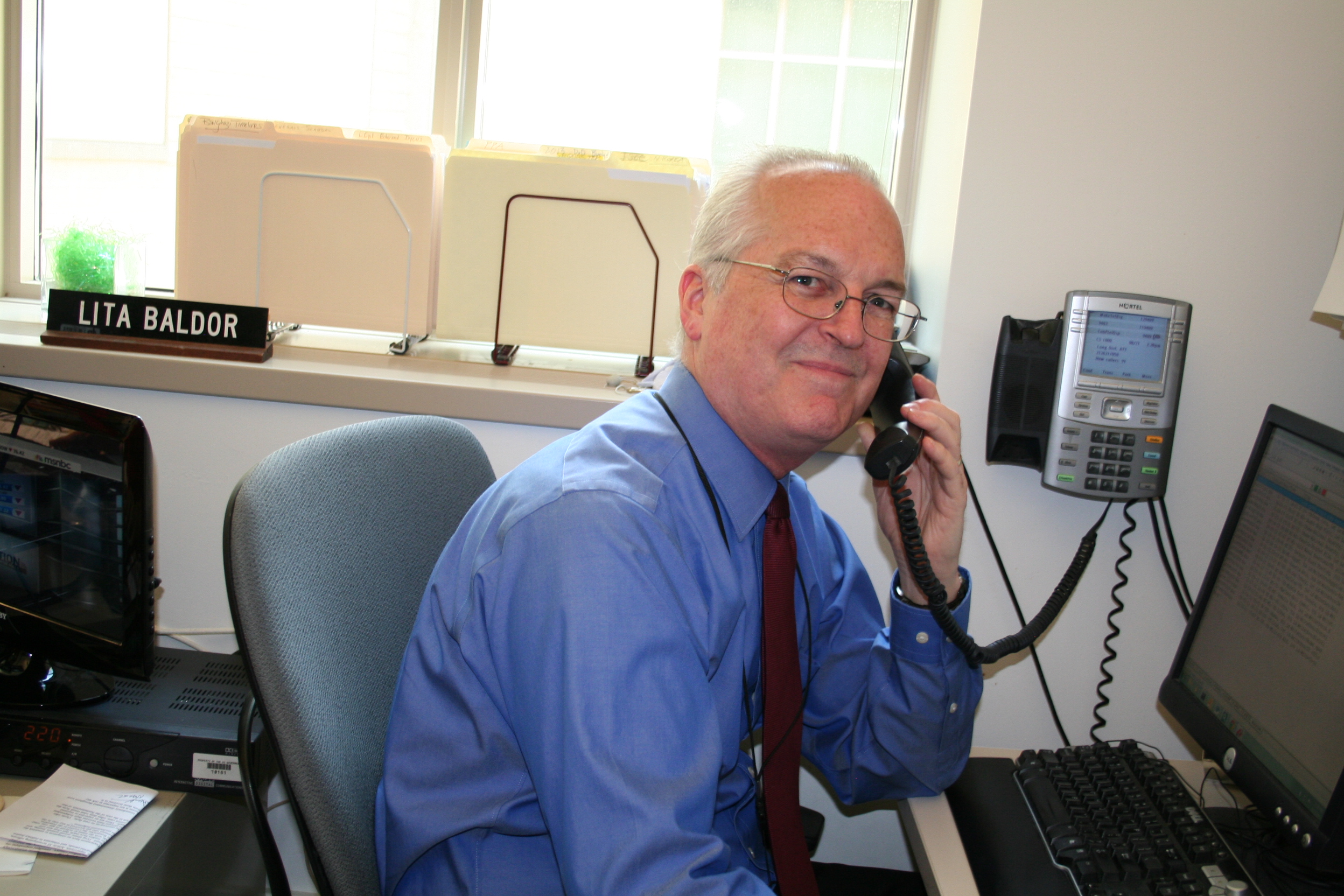

In this note to all AP staff, President and CEO Gary Pruitt announced the winners of the 2013 Oliver S. Gramling Awards. The Gramling Awards are an annual company-wide program created in 1994 to honor AP staffers for excellence. Each year, a committee selects winners in four categories – journalism, achievement, scholarship and spirit. All staffers are eligible. Awards range from $3,000 to $10,000. The funds come from an estate set up by the late AP broadcast executive Oliver S. Gramling. The winners receive their prizes at the annual AP Staff Recognition Awards Dinner.
AP Staff:
The winners of the 2013 Gramling Awards come from all walks of AP and speak to our global reach, commitment to mission and dedication to excellence. Their work reflects the passion I see in everyone who works here: from the intrepid journalists on the front lines to those behind the scenes who make the AP’s mission possible. They include people from far-flung places who embody the special spirit of AP to those who seek to improve their skills for the betterment of AP. I am honored to work among them.
The selections were made by a global team from varied disciplines at AP: David Ake, assistant chief of bureau for photos, Washington; Kate Butler, vice president, membership and local markets; Erin Madigan White, senior media relations manager; Niko Price, Europe editor; and Kerri Schultz, director of financial planning and analysis. It was a very tough field this year, the judges said, and their deliberations were long and difficult.
The winners will be honored at an awards ceremony dinner in New York, on Oct. 23, which will be attended by the AP Board of Directors.
Here are the 2013 Gramling Award winners:
$10,000 Gramling Achievement Award
- Mohac Bilecen, technology manager, Istanbul, Turkey. For years, AP spent time and money sending photo editors to work alongside photographers at major events because bandwidth limitations meant we couldn’t edit remotely. We had approached outside experts for a solution, but to no avail. Presented with the problem, Istanbul-based Technology Manager Mohac Bilecen had a simple answer: “We can do it.” And he did, developing an ingenious, no-cost solution that saves time and money by allowing editors to work from their home bases, increases delivery speed by allowing multiple editors to work on the same story and lets photographers spend more time shooting and less time transmitting. The tool is revolutionizing the way AP covers major events, the judges said.
- Karen Kaiser, associate general counsel, New York. When the U.S. Department of Justice seized a broad swath of AP phone records in its search for the source of a leak, AP faced one of the most serious threats to its First Amendment rights in recent history. Associate General Counsel Karen Kaiser orchestrated a fast and furious response that channeled industrywide outrage into an effective voice for change. This required diligent research and a finely tuned understanding of legal protections for journalists, as well as a clear-eyed ability to develop a broad strategy and specific proposals to prevent such over-reaching in the future. The outcome: stronger legal protections for all journalists and new life to the push for a federal shield law. AP’s outside legal counsel praised Kaiser’s “laser focus” and “extraordinary efforts.” The judges said Kaiser’s work will benefit reporters in the United States for years to come while also sending a strong message to journalists the world over.
$10,000 Gramling Journalism Award
- Alberto Arce, Honduras correspondent. Being a foreign journalist in Honduras is so harrowing there is only one. And because that one is AP’s Alberto Arce, readers know one of the world’s most tragic tales. Despite tremendous personal risk to him and his family, which had to be evacuated from Honduras, Arce uncovered story after story that the Honduran news media didn’t dare tell. He chronicled rampant drug cartel violence, the U.S. government’s role in supporting corrupt authorities and the impact of the mafia culture on Honduran society. He did so by telling about people: the father searching for his son’s killers, the gang member and his girlfriend who disappeared in police custody, the inmate who runs one of Honduras’ most dangerous prisons. And he did this, the judges noted, with a strong personal voice, always, as he wrote in one essay, bearing witness “to the most violent place in the world.”
- Robert Burns, national security writer, Washington, D.C. In the words of Washington Assistant Bureau Chief Wendy Benjaminson, Robert Burns, AP’s national security writer, is “a quiet, unassuming presence in a city filled with journalists of outsize egos.” From his tiny workstation in the crowded Pentagon press room, Burns has quietly stunned the military, the administration and the Washington press corps with his constant string of newsbreaks, narratives and investigative scoops. Using his strong source network, Burns broke stories on the runaway rate of military suicides, attacks on U.S. troops by Afghan allies, dysfunction in the office that works to collect the remains of wartime MIAs and more. Admired by colleagues and competitors and relied on to get the job done consistently for 35 years, Bob has had what Washington Bureau Chief Sally Buzbee calls “a run of reporting brilliance.”
$3,000 Gramling Spirit Award
- Baba Ahmed, Mali correspondent. AP’s coverage of his country has made Baba Ahmed the envy of the foreign press corps through his can-do spirit, his exhaustive Rolodex of sources and the fact that he is on a first-name basis with everyone from the country’s president to the al-Qaida terrorists trying to overthrow him. When extremists took over his hometown of Timbuktu, Baba traveled there repeatedly, despite the risks, to break news of what would become a major war. Working closely with West African Bureau Chief Rukmini Callimachi, Baba helped AP dominate coverage of this remote battle in the war on terror and tell compelling stories of the people caught in the crossfire. His resourcefulness, ingenuity and sheer gumption netted scoop after scoop, such as the time he excused himself from the Mauritanian ambassador, inside the Mauritanian embassy, to get a cup of coffee, then opened door after door until he discovered a massacre survivor the ambassador had said wasn’t there.
- Al-Emrun Garjon, video stringer, Bangladesh. When a building full of factories collapsed in Bangladesh, we called Al-Emrun Garjon — but he was already on his way. Garjon would work nonstop for two weeks with bravery and relentlessness to put AP well ahead of its competitors on the world’s top story. When he realized the best way to capture the tragedy was to travel into the collapsed building with rescue workers, he crawled through a hole drilled in the concrete slabs, descending into a hellish world of dead, dying and trapped factory workers. There, he filmed Mohammad Altab, pinned by the rubble, pleading tearfully to be reunited with his two children: “Save us brother. I beg you brother. I want to live.” Altab did not make it, but his story drew world attention to the plight of the garment workers and helped enact real change in conditions in factories across Bangladesh. Derl McCrudden, head of video newsgathering, wrote: “We had so many stories from the scene it felt like we had multiple cameras there, all tasked with gathering different elements of the story. In fact, we had Garjon.”
$3,000 Gramling Scholarship Award
- Karly Domb Sadof, New York headquarters photo editor. Sadof will pursue a master’s degree in visual and media anthropology at Freie Universitat Berlin. She intends to use the program to help understand how people use photos, and how AP’s report can more effectively meet their needs.
- Nick Harbaugh, newsperson, Global Interactive department. Harbaugh will use his award to study analytics and data visualization at New York University. He intends to use the training to keep AP competitive in using data visualization to break news and tell stories.
On this, the 20th anniversary of the Oliver S. Gramling Awards of Excellence, please join me in congratulating the talented and deserving winners of this year’s prizes.
Gary Pruitt



